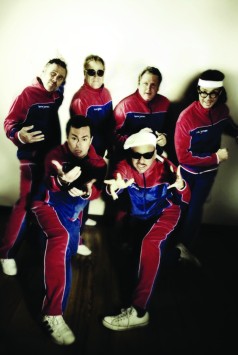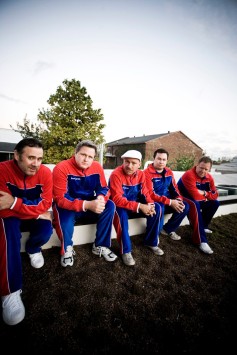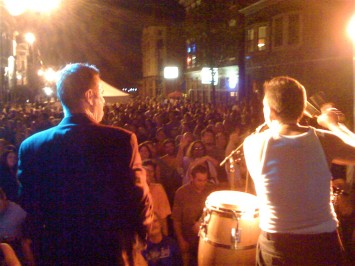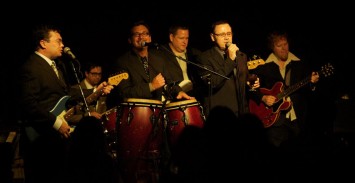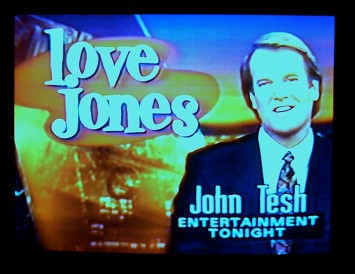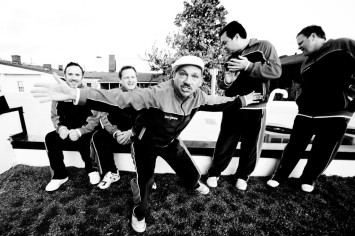social bookmarking tools:
 |
|
| Available RSS Feeds |
|---|
 - Top Picks - Top Picks |
 - Today's Music - Today's Music |
 - Editor's Blog - Editor's Blog
|
 - Articles - Articles
|
Add Louisville Music News' RSS Feed to Your Yahoo!
|
Love Jones Plays On
One has to respect the fact that the members of Love Jones don't spew any bitterness about the way the music business treated them.
A group of Louisville lads who had an idea for a sound that ran contrary to the grunge of the early 1990s, Love Jones built a local following, moved to California, rose quickly, got some great press – and then drifted away amid some unlucky breaks and poor timing.
"We were probably just a hair early," said bassist Barry Thomas, "but I thought we were good enough to be a little more successful than what we were. It is what it is. I have no regrets."
Percussionist Ben Daughtrey echoes those emotions, while being a bit more flippant. Asked what prevented the group from going further, he responded: "The band's physical attractiveness? The fact that we played music that was out of step with the times? Fate? My life decisions? Commitment from the label?"
All of these are questions to ponder, but Daughtrey quickly adds, "Ultimately, it all doesn't really matter. Those who live in the past will miss out on the present. We were given an amazing opportunity that millions of people would willingly give a body part to have, and I have a lot of gratitude for that."
Fortunately, the band plays on. While it is split now between Louisville and Los Angeles, the members of Love Jones come together at least a couple of times a year to perform once again, and released an album of new originals last fall called Forever. They remain a Derby week regular in Louisville, including a Derby Eve concert this year at Headliners Music Hall.
Sure, they're spread out on separate coasts, but that isn't stopping them.
"It's sort of like Ocean's 11," said Love Jones singer Jonathan Palmer. "We have to really work to get the gang together for each heist. And there are trucks of money involved. But honestly, getting on a plane is a breeze. It's the challenges of leaving kids behind and jobs – that's the tough part."
THE GOOD OLD DAYS
Love Jones' story has been well-documented, as they were among the first lounge/swing acts to burst forth in the early 1990s, along with Squirrel Nut Zippers, Big Bad Voodoo Daddy and others. Bands like these and their fans were dubbed "Cocktail Nation," and celebrated the lounge music of the 1950s and '60s with jazzy arrangements, crooning vocals and dry martinis.
When the band moved to Los Angeles in 1992, it became a regular at the club Largo, and it didn't take long before Zoo Entertainment – which also had artists such as Matthew Sweet and Tool in its stable – offered the band a recording deal.
"In 1991, we were playing this fake jazz, wearing suits and kind of putting on a show," Thomas recalled. "We thought, ‘This is something kind of unique.' We wished entertainment would get back to this. Then the whole lounge thing happened. The whole ‘lounge nation' thing was put together by Jonathan and our publicists."
The band's debut album, Here's to the Losers, was recorded and hailed by the media, while the band toured relentlessly, opening for bands like Afghan Whigs and Presidents of the United States of America along the way.
Love Jones' music also appeared in a number of films, including "Since You've Been Gone" starring Terri Hatcher, and "French Exit" with Jonathan Silverman. The band also appeared as the wedding band in the film "The Sweetest Thing," starring Cameron Diaz and Christina Applegate.
Perhaps most notably, however, Love Jones' song "Paid For Lovin'" appeared in the film "Swingers," which was written and directed by Jon Favreau, and starred Favreau and Vince Vaughn. The band had struck a friendship with the two actors, who were regulars at Love Jones shows, during the days when Favreau was polishing the "Swingers" script and looking for financial backing.
Thomas, who served as music consultant on the film, said Love Jones was originally slated to appear in "Swingers," but that Zoo arranged a tour for the band at that time to promote the second album, Powerful Pain Relief.
"We weren't going to cancel a tour to be in a movie some friends of ours were making," Thomas said. Of course, "Swingers" went on to become a cult classic, launching the careers of Vaughn and Favreau. The film's final scene also marked a key appearance for Big Bad Voodoo Daddy and helped gain Cocktail Nation a more widespread reputation.
While that missed opportunity wasn't a make-it-or-break-it moment, perhaps what tripped up Love Jones most was that the head of its label, Lou Maglia, took a leave of absence for health reasons.
"Lou wasn't around when it came time to make our second record," guitarist/vocalist Chris Hawpe said, "and we were kind of forgotten by the leadership group that came in to work while Lou was out. They put out the second album and barely told a soul about it. That was pretty much the end for us at Zoo Entertainment."
Thomas noted that the band voluntarily got out of the Zoo contract, certain another record deal would be forthcoming. It wasn't. Another blow was that, when it became clear Zoo was not going to promote the second album as well as it had the first, Daughtrey, who was already married with children, decided he'd had enough.
"At that point in time, I was the only band member married with a kid, and we were spending an inordinate time on the road and making very little money," he said. "I really didn't want to miss any more time with my beautiful new family, and I desperately needed to make a living."
So he moved his family back to Louisville and began working a "real" job – er, make that three real jobs. Initially, he loaded planes during the night shift at UPS, tended bar and literally dug ditches to make ends meet.
"It's important to put this into perspective," Daughtrey said, "that, two weeks earlier, before moving home, we had just released our second album, were interviewed on Entertainment Tonight, and were the toast of the town here in La La Land. Meanwhile, I couldn't scratch two nickels together to make a dime."
When he announced to the band he was leaving for home, the rest of the guys were young and mostly single, still wanting to focus fully on the music. His decision didn't go over well.
"They wanted me to commit 100 percent to the band," Daughtrey said. "Meanwhile, I'm trying to discern all of this while changing diapers after getting home from my second job at 5 a.m. Counter in my problems with depression and alcohol, and you've got the perfect ingredients for a meltdown, personally and band-wise."
But things were getting away from the band well before Daughtrey packed it in. With new leadership in place at Zoo, things simply weren't the same. Thomas points out that by the time the second album was being made, that new leadership had just started to "get" the first album. The label had told the band to focus more – the first album was "all over the place, stylistically," Thomas said – and find a sound.
And then, the label ironically didn't "get" the second album, even though the band had done exactly as it was told. As a result, the album didn't get promoted properly, with Zoo instead focusing on two key acts: One was a singer called Native, and the other was Rosco Martinez, who Thomas said was being touted as "the Latin Sammy Hagar."
The Latin Sammy Hagar? Yeah, taking a back seat to that would kill any band's career.
IT AIN'T OVER 'TIL IT'S OVER
The rest of the band pushed on without Daughtrey, and a few promising prospects came up – there was still some buzz going, even though Thomas said by then the lounge movement had become something of a parody of itself.
"It got away from us," he said. Love Jones didn't like being compared to bands they didn't feel fit the scene, from Combustible Edison to Barenaked Ladies.
"We had this vision of a music scene … and there were some pretty good bands coming out of it," he said. "But once it happened, we didn't like it. Looking back on it, we were probably taking it too seriously ourselves."
Love Jones even read for a Fox TV pilot about the band, but the pilot never got made. It wasn't long until things slipped away. The band kept working through 1997, but the members were ultimately forced to get jobs to make ends meet. Then life happened, and Love Jones faded away.
But around 2000, the band started playing shows together and writing new songs again. Each member had his own thing going on – each one still does – but they were drawn together. So one might say Love Jones never really went away, but rather took a long nap.
The band's original drummer, Stuart Johnson, still is a professional musician. He has played with a number of high profile acts such as the New Radicals as well as Matthew Sweet and Susanna Hoffs, and appeared with the latter two in the Austin Powers films as the drummer for Ming Tea.
These days, Daughtrey, 45, works in television and is currently co-executive producing a documentary series for A&E chronicling the Laredo (Texas) Police Department's narcotics division. Palmer, 44, meanwhile, works in music publishing for Columbia Records, placing music in films, TV and advertising. The two also do a monthly Vaudeville-style show at Largo titled "Daughtrey and Palmer's Entertainment Kingdom."
Thomas, 48, lives in Louisville and restores and sells antiques, while Hawpe, who turns 43 in May, works at Yum! Brands doing photography, voice-over work and multimedia production. He also performs often with Peter Searcy.
The core Love Jones members, in addition to playing as many shows as they can together, spent three years making Forever. The band tentatively plans to record more, but may focus on singles rather than full-length albums.
"The new record is aptly named," Hawpe said. "It took seemingly forever to make. … We all have lives in various places and it's obviously tough for everyone to get in the same room. The cool thing about making records today is that you can collaborate more effectively than ever from different places in the world."
They worked on the album with guitarist Phil Gough, who lives in L.A., and the core members still in Louisville recorded many parts here. They still rehearse regularly as well.
Where once these Louisville natives were up-and-coming, now they are content to still be able to call themselves Love Jones.
"We're kind of doing it for our own selfish reasons now," Thomas said, "and to have a creative outlet. I think we're lucky that the style of music we do, we can do until we're 70 years old. It's not like we're a grunge band – those guys would look kind of silly after a while. It's kind of like, instead of playing football, we decided to play tennis or golf when we were growing up."
Asked why the band still does it, in spite of the geographical complications, Daughtrey said, "Brotherhood, plain and simple. It sure ain't the money. I love these guys. I always described it this way: It's like a five-way, celibate, homosexual marriage; how could it get any better than that? Wait, don't answer that."
"The guys in Love Jones were really good friends before the band even played a note," Hawpe said. "I have known Ben Daughtrey and Jonathan Palmer since middle school. … . I think that is the main reason we are still playing together, we're still close friends and playing music is what we like to do together."
"It's fun," Palmer said. "It's like the old basketball player who can't resist a good pickup game. And it's always nice to reconnect with an audience that is still into what we do. Also, we're more on our game now than we ever were then, so it's pretty exciting to be able to perform at such a high level at this point."
"Think of our band like Christmas," Daughtrey deadpanned. "It's a lot of fun and it happens once a year."
And the past is the past. Not one member of Love Jones has any regrets or considers the band a near-miss or a should've-been.
"I don't think we missed, really," Palmer said. "We sold about 40,000 albums, made a nice living touring, and had fans show up to see us nearly everywhere we played. We got to be in movies, TV shows and had a lot of great coverage in the press. … We've managed to stay friends, and are still able to entertain a crowd better than 90 percent of the bozo bands out there."
Hawpe does wish there was one decision that could be re-made – he wishes they had accepted a large advance from the label when signing.
"What we five naive Kentucky boys learned the hard way was, the more money they spend on you up front, the harder they promote your records," he said. "We actually told the label we didn't want a big advance, thinking they would think what good guys we were. You live and you learn. However, I honestly don't regret any of it. I got to travel and play music with my friends and call it a job. I must be the luckiest guy in the world!"
"Regret is a bullshit emotion," Daughtrey said. "We did what we did; what happened, happened – that time is gone. Onward and upward, I say."
And so, Love Jones will be coming periodically to a venue near you, starting with Derby Eve at Headliners. And in a few months you might catch them in L.A. at their old stomping grounds, Largo. fJust how long might this go on?
"I think we will always play together in some form or another," Hawpe said. "These guys are my closest friends."
Daughtrey concurs. Love Jones will continue on, he said, "Till they drag us off the stage and push us in a hole."

